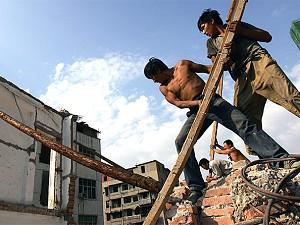WASHINGTON, D.C.—Rural Chinese workers are the key component of the current Chinese economic growth. Yet as a group, these workers struggle at the bottom of society. In recent years, suicide among rural workers is reaching an alarming rate, and yet it is ignored by Chinese officials.
Dongguan City, Guangdong Province, for instance, has a population of migrant to local workers of 6:1, and in some regions, as high as 10:1. Hong Kong newspaper The Sun reported that between April and September, 552 people committed suicide. Nearly 400 of them were migrant workers, according to the First Aid Center of Dongguan City.
Since May, when the first aid hotline was available in Dongguan City, it answered nearly 10,000 calls. About 80 percent of the callers were migrants, and 20 percent of the callers expressed a suicidal intent.
According to a 2006 Nanjing Youth SOS Center Survey, more than 10 percent of the migrants in Nanjing had considered suicide.
Poor Environment and Lack of Support
Zhao Dagong, a writer from Shenzhen, made several trips to Dongguan to study migrants a few years ago. He believes that the high suicide rate among migrants, to a certain extent, is related to the feeling of loss and loneliness, as well as culture shock.
“The migrants are peasants from impoverished areas. Their hard work builds cities and supports the prosperity of urban residents. However, the cities have not accepted these outsiders. They are a group of people away from home and family, who work under intensive labor requirements, are discriminated [against], and have no family or social support. They live an isolated life,” says Zhao.
“Migrant workers lead a depressing life. Their jobs require them to face a polluted environment and intensive labor. They spend their days in workshops with improper diets. There is no social life or cultural activity. Basically, there is no psychological balance.”
Zhao also adds, “Many migrant workers are in their 20s or 30s. Often they choose the extreme— suicide—as a final resort to resolve their frustration.”
A Means to Defend Their Legal Rights
Cai Chongguo, a New York based China Labor Watch spokesman, indicates that Chinese rural workers typically have no normal channels of justice when their rights are violated. “Death to defend their rights”—suicide—has become a means of seeking justice.
Cai says, “We can see, based on the statistics, that the main cause of suicide or attempted suicide is an arrear of wages.”
According to a 2002 survey of more than 900 businesses in Zhejiang Province, the National Bureau of Statistics data shows there was an average of over 1,500 yuan (approximately US$195) wage arrears per capita. The 2006 “Report on Chinese Migrant Workers” by The Chinese State Council Research, states that 48 percent of the workers get paid on time, whereas 52 percent of them either occasionally or frequently experience salary arrears.
Collapsed Morality a Social Problem
Cai Chongguo believes the high suicide rate among Chinese migrant workers reflects both a serious deficiency in the labor dispute system in China, and the ignorance and apathy of society towards migrant workers.
He says, “The government ignores them, people sneer at them, and even the media have no sympathy for them. This is not just an issue of human rights, but also an issue of collapsing morality as a social norm.”
To Cai, the fundamental solution to the high suicide rate among rural migrant workers is to establish their own union to strengthen their position during the arbitration process. He recognizes the hurdles to establishing an independent union in China. Meanwhile, Cai calls for more support from civil institutions and non-governmental organizations for those peasants in plight.
